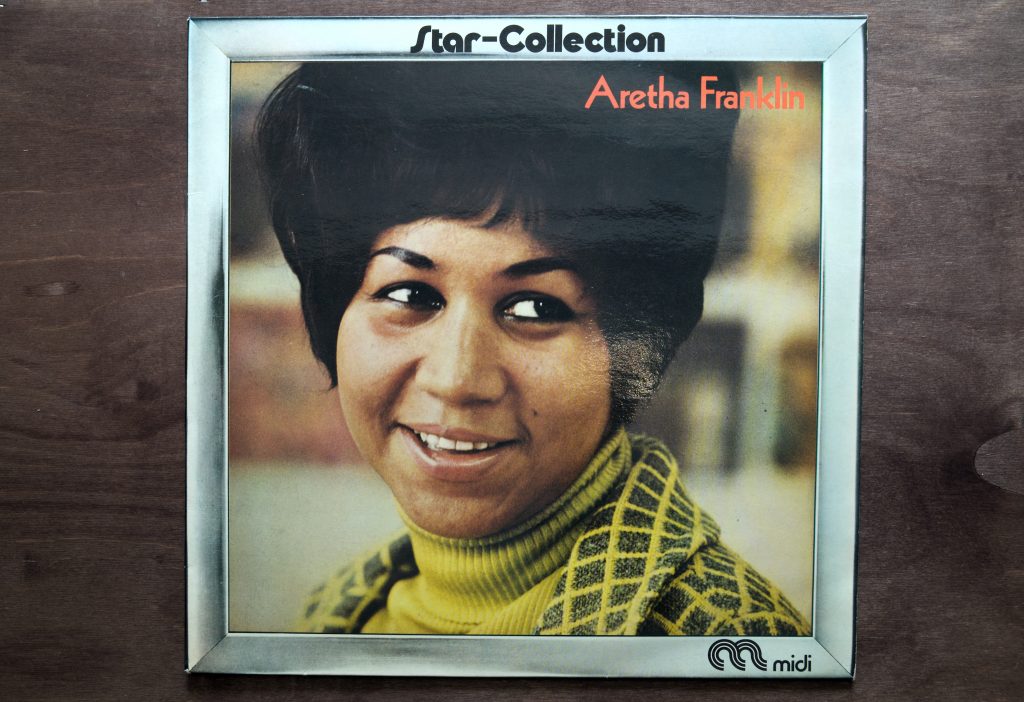On this day in 1987, rock star icon Aretha Franklin became the first woman in history to be inducted into the Rock & Roll Hall of Fame.
Often hailed as the “Queen of Soul,” Franklin revolutionized R&B with a rawness and emotional depth that reshaped the genre. Her career took flight in the 1960s, but it was her electrifying rendition of Otis Redding’s Respect that cemented her as a cultural and musical icon. At just twenty-five years old, Franklin didn’t just sing the song—she transformed it into a powerful anthem that resonated across generations.

“The Queen of Soul,” singer Aretha Franklin, sings May 1 during the entertainment section of the annual White House Correspondents Dinner. Franklin sang several of her hit songs, and received a standing ovation from the audience and President Clinton. gac/Photo by William Philpott REUTERS
Her voice, both velvety and impassioned, captured the struggles and triumphs of her era, seamlessly blending gospel, blues, and pop. Music was in her blood. Franklin had grown up singing alongside her father, renowned Reverend C.L. Franklin of Detroit, Michigan, who was known as the “man with the million-dollar voice.” His recorded sermons were widely popular, connecting him to many of the titans of Black music, including Mahalia Jackson, Clara Ward, Sam Cooke, and Lou Rawls. Following in their lead, Franklin found her footing in gospel music and toured the evangelical circuit before moving out to New York with the help of her father to begin pursuing music on her own.
She released her first non-gospel single, Today I Sing the Blues, in 1960, which rapidly reached #10 on R&B charts. The song’s unique fusion of gospel cadences and Broadway-style pop foreshadowed the genre-bending sound that would make her a legend. After a series of one-off hits across various labels, Franklin signed with Arista Records in 1980, ushering in yet another chapter of her career.
Throughout her musical journey, Franklin amassed a staggering array of accolades, including 18 Grammy awards, the National Medal of Arts, and the Presidential Medal of Freedom. Her legacy was emboldened with inductions into other prestigious institutions such as the Gospel Music Hall of Fame and, posthumously, the National Women’s Hall of Fame in 2020.

epa06953192 US singer Aretha Franklin’s star on the Hollywood Walk of Fame is adorned with flowers, candles and cards in Hollywood, California, USA, 16 August 2018. Franklin died at the age of 76 from pancreatic cancer at her home in Detroit, Michigan. EPA/MIKE NELSON
Her hit albums I never loved a man the way I love you, Respect, Baby I love You, (You Make Me Feel like) A Natural Woman, Chain of Fools, Think, and I Say a Little Prayer earned her no less than 20 top #10 appearances on Billboard nearing the end of the 20th century. She would reach the top 10 album chart one more time after the release of her 1972 gospel album Amazing Grace.
In the end, Franklin charted 73 unique songs in the Hot 100 and 112 tracks overall across different Billboard charts.

Her induction into the Rock & Roll Hall of Fame was groundbreaking, not just for her, but for all women in music. Even today, a disproportionately small number of female artists are featured in the Hall of Fame. In its second decade, the Hall began to recognize more female trailblazers, including Etta James in 1993, Joni Mitchell in 1997 and Bonnie Raitt in 2000. Stevie Nicks was the only woman to have ever been inducted twice—once for Fleetwood Mac, and then again as a solo artist.
While most inductees to the Rock & Roll Hall of Fame have been men and only 37 female performers currently sit in the Hall of Fame, Aretha’s achievements set the stage for the success of generations of black female artists to grab the world’s attention.

The Clark Sisters perform at the funeral service for Aretha Franklin at the Greater Grace Temple in Detroit, Michigan, U.S., August 31, 2018. REUTERS/Mike Segar
Rock & Roll Hall of Fame inductee Gladys Knight took to Twitter to bid farewell to the Queen of Soul after she passed in 2018.
“Aretha, your music set a standard for every single lady in this industry to rise to,” she wrote. “You have touched minds, hearts and spirits… hopefully I’ll get to sing with you in the Heavenly Choir.”






